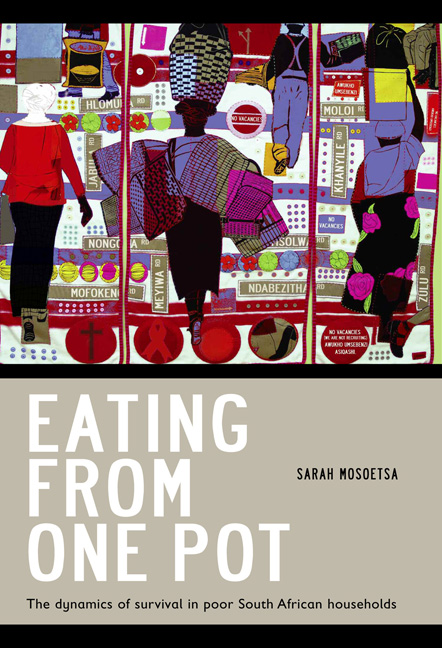Book contents
- Frontmatter
- Contents
- Foreword
- Acknowledgements
- Introduction
- Chapter 1 ‘Sharing the little I have with my family’: the allocative rules of household resources and income
- Chapter 2 ‘My wife does not respect me anymore’: unequal power dynamics in households
- Chapter 3 ‘I remain an ANC member, but …’: civil society in Mpumalanga and Enhlalakahle
- Chapter 4 Theoretical and Policy Implications
- Conclusion: Poor households are fragile sites of stability
- Selected Bibliography
- Index
Conclusion: Poor households are fragile sites of stability
Published online by Cambridge University Press: 20 April 2018
- Frontmatter
- Contents
- Foreword
- Acknowledgements
- Introduction
- Chapter 1 ‘Sharing the little I have with my family’: the allocative rules of household resources and income
- Chapter 2 ‘My wife does not respect me anymore’: unequal power dynamics in households
- Chapter 3 ‘I remain an ANC member, but …’: civil society in Mpumalanga and Enhlalakahle
- Chapter 4 Theoretical and Policy Implications
- Conclusion: Poor households are fragile sites of stability
- Selected Bibliography
- Index
Summary
The case studies that have been described in this book present a vivid picture of conditions in poor households in the townships of Mpumalanga and Enhlalakahle in the province of KwaZulu-Natal. That this situation is typical of poorer households more generally is borne out by studies in other parts of the country. In the absence of wage employment and an effective welfare state, the poor have retreated to the household and adopted diverse socio-economic livelihood activities. The household has become the only site of stability for most people as well as their only means of survival. However, most households are not safe and secure environments. They are vulnerable and face overwhelming challenges in the form of ill health and a lack of income and food. They also have limited access to essential services such as shelter, water and electricity. While a few households have managed to improve their position by increasing their assets and access to resources, and some are making ends meet, the majority are descending further and further into poverty.
It has become clear, during the course of this study, that older women have become central to the livelihood activities of households and communities at a time of massive job losses in the formal economy. This is largely the result of their traditional role as caregivers, the income that they derive from government pensions and the incapacity, through ill health or income loss, of other family members. The centrality of women in households has not resulted in a role reversal or the ‘end of patriarchalism’, though, as some theorists have suggested it would (see, for example, Castells,1997) or as has been the case in Russian households (Burawoy, Krotov, and Lytkina, 2000). While it is true that patterns of male domination and female subordination are changing in the two townships, in accordance with shifting class and economic dynamics, patriarchal values and practices remain the norm. These values and practices, however, are no longer underpinned chiefly by the economic position of men as breadwinners but by a reassertion of traditional and cultural values. The study reveals a twofold and simultaneous involution in the two areas: towards the household (Burawoy, Krotov & Lytkina, 2000) and towards the patriarchally-based cultural values that ideologically bind the household. However, the appeal to traditional patriarchal values does not pass without challenge.
- Type
- Chapter
- Information
- Eating from One PotThe dynamics of survival in poor South African households, pp. 147 - 151Publisher: Wits University PressPrint publication year: 2011



